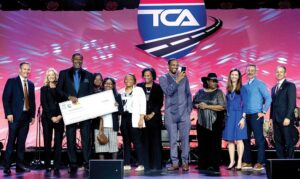WASHINGTON — Two major trucking groups are opposed to the Federal Motor Carrier Safety Administration’s (FMCSA) decision to consider petitions for waivers related to two states’ meal and rest break (MRB) rules, while a third says they are studying the proposal.
In 2018, the FMCSA ruled that California’s MRBs for commercial motor vehicle drivers were preempted by federal hours-of-service regulations. The agency made the same determination in 2020 with regard to Washington state’s MRBs.
Both states’ rules are stricter than federal regulations.
Under the United States Code, states are prohibited from enforcing a law or regulation on commercial motor vehicle (CMV) safety that the Secretary of Transportation has determined to be preempted.
Now, however, the FMCSA is accepting waivers that would allow those stricter state rules to be enforced as long as the petitioner “demonstrates to the agency’s satisfaction that a waiver from federal preemption is in the public interest and is consistent with the safe operation of CMVs.”
Under the California Labor Code, employers must provide nonexempt employees a 30-minute meal break if they work more than five hours in a day, and employees who work a shift of 10 hours or more are entitled to a second 30-minute meal break.
The California Code of Regulations states that employers are required to provide rest periods for non-exempt employees who work three-and-a-half or more hours in a day. Employees are entitled to a 10-minute rest period for each four hours, or a substantial fraction thereof, that they work in a day.
To the extent possible, these breaks are to be taken in the middle of each four-hour period.
California law provides that an employer shall not require an employee to work during a mandated meal or rest break and provides for additional pay as a remedy for violating that prohibition.
Under the Washington Department of Labor and Industries’ regulations, employers must provide employees a meal period of at least 30 minutes that commences after the second hour and before the fifth hour after the shift commences.
In addition, Washington’s MRB rules provide for a 10-minute rest period “for each four hours of working time” and must occur no later than the end of the third working hour. The rest period must be scheduled as near as possible to the midpoint of the 4 hours of working time, and no employee may be required to work more than three consecutive hours without a rest period.
Federal hours-of-service rules require that drivers only be provided a 30-minute break after eight hours of driving time (instead of on-duty time) and allow an on-duty/not driving period to qualify as the required break.
The Washington Trucking Association has contended that the stricter state regulations could make a lack of truck parking worse because drivers would have to spend more time looking for a place to shut down while they rest — or park in an unsafe area.
The Truckload Carriers Association (TCA) and the American Trucking Associations (ATA) also oppose the state rules.
“The Truckload Carriers Association opposes any effort to institute the California and Washington state meal and rest break laws and supports the implementation of the federal rules pertaining to meal and rest breaks,” said Dave Heller Sr. vice president of safety and government affairs at TCA.
ATA President and CEO Chris Spear said the ATA is for “a singular, national standard of work rules for professional drivers is crucial to both safety and the supply chain.”
“Federal law already mandates rest breaks for drivers,” he added. “Unnecessary and duplicative state laws are not grounded in safety and have been primarily enforced via private lawsuits designed to extort the trucking industry. Opening the door to this spurious litigation once again would impair the safe and efficient movement of interstate goods.”
Spear said that the ATA “is fully prepared to oppose this effort that would result in a confusing patchwork of regulations. We will leverage all of our Federation’s resources to stop this in its tracks.”
Meanwhile, the Owner-Operator Independent Drivers Association (OOIDA) hasn’t taken a firm stance on the issue.
“OOIDA represents over 150,000 small business truckers across the United States, some who operate exclusively within their state borders but many more who have interstate operations,” according to a statement. “We are currently analyzing the waiver request from FMCSA based on OOIDA member feedback on intended benefits and potential unintended consequences.”
The FMCSA requests that any waiver petition address the following issues, in addition to any other relevant issues:
- Whether and to what extent enforcement of a State’s meal and rest break laws with respect to intrastate property-carrying and passenger-carrying CMV drivers has impacted the health and safety of drivers.
- Whether enforcement of State meal and rest break laws as applied to interstate property-carrying or passenger-carrying CMV drivers will exacerbate the existing truck parking shortages and result in more trucks parking on the side of the road, whether any such effect will burden interstate commerce or create additional dangers to drivers and the public, and whether the applicant intends to take any actions to mitigate or address any such effect.
- Whether enforcement of a State’s meal and rest break laws as applied to interstate property-carrying or passenger-carrying CMV drivers will dissuade carriers from operating in that State, whether any such effect will weaken the resiliency of the national supply chain, and whether the applicant intends to take any actions to mitigate or address any such effect.
Born in Pine Bluff, Arkansas, and raised in East Texas, John Worthen returned to his home state to attend college in 1998 and decided to make his life in The Natural State. Worthen is a 20-year veteran of the journalism industry and has covered just about every topic there is. He has a passion for writing and telling stories. He has worked as a beat reporter and bureau chief for a statewide newspaper and as managing editor of a regional newspaper in Arkansas. Additionally, Worthen has been a prolific freelance journalist for two decades, and has been published in several travel magazines and on travel websites.











